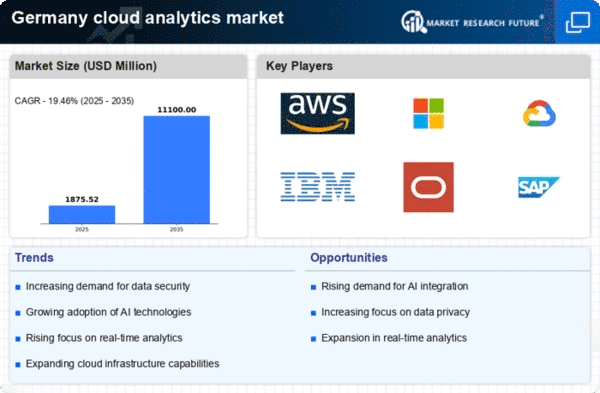Expansion of Cloud Infrastructure
The cloud analytics market in Germany is significantly influenced by the ongoing expansion of cloud infrastructure. As more businesses migrate to cloud-based solutions, the demand for robust analytics tools increases correspondingly. The German government has been actively promoting digital transformation initiatives, which include investments in cloud technologies. Reports indicate that the cloud services market in Germany is projected to reach €30 billion by 2026, with a substantial portion allocated to analytics services. This expansion not only facilitates the adoption of advanced analytics but also enhances the overall capabilities of organizations to process and analyze large datasets efficiently. As cloud infrastructure continues to evolve, it is expected to provide the necessary foundation for innovative analytics solutions, thereby propelling the growth of the cloud analytics market.
Rising Demand for Real-Time Data Insights
The cloud analytics market in Germany experiences a notable surge in demand for real-time data insights. Businesses increasingly recognize the value of immediate access to analytics, which enables them to make informed decisions swiftly. This trend is particularly pronounced in sectors such as finance and retail, where timely data can significantly impact operational efficiency and customer satisfaction. According to recent studies, approximately 70% of organizations in Germany are prioritizing real-time analytics to enhance their competitive edge. This growing emphasis on immediacy in data processing is likely to drive investments in cloud analytics solutions, as companies seek to leverage cloud capabilities for faster data retrieval and analysis. Consequently, the cloud analytics market is poised for substantial growth as organizations adapt to the need for agility in their data-driven strategies.
Emergence of Advanced Analytics Technologies
The emergence of advanced analytics technologies is a pivotal driver for the cloud analytics market in Germany. Innovations such as predictive analytics, natural language processing, and machine learning are transforming how organizations analyze data. These technologies enable businesses to uncover deeper insights and forecast trends with greater accuracy. In Germany, the adoption of such advanced analytics tools is on the rise, with a reported increase of 40% in usage among enterprises over the past year. This trend suggests that organizations are increasingly recognizing the value of sophisticated analytics in gaining a competitive advantage. As these technologies continue to evolve, they are expected to further stimulate growth in the cloud analytics market, as companies seek to leverage cutting-edge solutions to enhance their analytical capabilities.
Growing Focus on Data-Driven Decision Making
In Germany, there is a pronounced shift towards data-driven decision making across various industries, which serves as a key driver for the cloud analytics market. Organizations are increasingly leveraging analytics to derive actionable insights from their data, thereby enhancing operational efficiency and strategic planning. A survey conducted among German enterprises revealed that over 60% of decision-makers consider data analytics essential for their business strategies. This trend is likely to encourage investments in cloud analytics solutions, as companies seek to harness the power of data to inform their decisions. The cloud analytics market stands to benefit from this growing emphasis on data utilization, as organizations recognize the potential of analytics to drive innovation and improve performance.
Increased Regulatory Compliance Requirements
The cloud analytics market in Germany is also shaped by the increasing regulatory compliance requirements that businesses must adhere to. With the implementation of stringent data protection laws, such as the General Data Protection Regulation (GDPR), organizations are compelled to adopt analytics solutions that ensure compliance while maximizing data utility. This regulatory landscape creates a demand for cloud analytics tools that not only provide insights but also incorporate features for data governance and security. As companies navigate these complexities, the cloud analytics market is likely to see a rise in demand for solutions that facilitate compliance without compromising on analytical capabilities. This trend underscores the importance of integrating compliance features into cloud analytics offerings, thereby enhancing their appeal to German businesses.
















